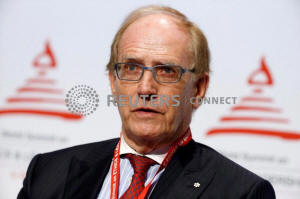|
Match-fixing not doping poses greatest risk to sport
 Send a link to a friend
Send a link to a friend
 [April 26, 2019]
By Steve Keating [April 26, 2019]
By Steve Keating
TORONTO (Reuters) - Two of the men that
put the doping crisis in the global spotlight say the integrity of
sport now faces a greater threat from match-fixing than drug cheats.
Richard McLaren, who authored a 2016 report into state-sponsored
Russian doping and David Howman, a former director general of the
World Anti-Doping Agency (WADA), painted an alarming picture about
match-fixing at the Symposium on Match Manipulation and Gambling in
Sport in Toronto on Wednesday and Thursday.
McLaren, a Canadian law professor and CEO of McLaren Global Sport
Solutions, told Reuters that doping and match-fixing combined were
the two biggest issues affecting the integrity of sport.
Yet manipulating outcomes was a bigger problem, he said.
"What makes sport different than entertainment is unpredictability.
Fixing results removes the greatest and most important
characteristic, that unpredictability," he added.

"If it loses unpredictability because of fixed results the passion
for sport is diminished and that is a much bigger issue."
Match-fixing has become increasingly pervasive in recent years
across a number of sports.
More tennis players, for example, were disciplined for violations of
anti-corruption rules in 2018 than in any other year in the last 10.
[nL8N1Z958H]
A number of cases in other sports have also brought renewed
attention to the issue.
Recent punishments include the banning of a soccer referee for life
in February for accepting bribes to manipulate matches [nL5N20L7AM]
and the suspension of two snooker players for fixing the outcome of
matches or failing to report a corrupt approach. [nL5N2017A3]
CRIME SYNDICATES
Organized crime has been the driving force behind sports corruption,
according to Howman, and the globalization of sports betting has
allowed crime syndicates extend their reach and match manipulation
expertise.
"I have done a lot of work in the general sport integrity area and I
can quote you what I am told by people who work in that more general
business, including enforcement agents, and they all say the biggest
threat to sport integrity is organized crime," Howman, a New
Zealand-based barrister who was director general at WADA from 2003
to 2016 and now serves as the chair of the Athletics Integrity Unit,
told Reuters.
"We saw it coming at WADA and I raised it during my term there as a
significant issue that needed to be countered by world sport,
because the bad guys involved in pushing dope and steroids are the
same bad guys involved in match manipulation."
Andy Cunningham, director of integrity services for Sportradar, a
company that monitors betting patterns and offers intelligence to
over 100 sports governing bodies, said exact figures for how much is
bet on sport are at best a "guesstimate".
Interpol, however, set the figure at $500 billion a year.
[to top of second column] |

WADA Investigation team member Richard McLaren attends the World
Summit on Ethics and Leadership in Sports at the headquarters of
FIFA in Zurich, Switzerland September 16, 2016. REUTERS/Ruben Sprich/File
Photo

Operating in every corner of the globe, match-fixers work to
manipulate the outcome of everything from World Cup matches to the
lower rungs of the International Tennis Federation's (ITF) Futures
tournaments.
Sportradar reported in 2015 it had identified as many as 60 fixed
matches in the Canadian Soccer League (CSL), a small league
operating mostly in Southern Ontario with few supporters that was
for years the target of Asian match fixers.
In the most recent Sportradar report, Cunningham said the CSL had
largely cleaned up its act and Asian bookmakers had lost interest.
Yet the CSL is an example of just how far the tentacles of gambling
syndicates reach.
Whether it is an under-16 soccer international or a lower-level
tennis match, the targets for match-fixers are often amateurs or the
less well-paid in professional sport.
NO GLOBAL AGENCY
McLaren pointed to an ITF-commissioned report that found only 600 of
the nearly 14,000 players competing in ITF competitions made enough
money to cover their costs, providing an impoverished pool of
athletes for fixers to target.
There is no global agency in place to fight corruption in sport in
the way WADA was set up to combat doping and nor, according to
Howman, is there ever likely to be such an organization.

Instead the fight is being left to often ill-equipped individual
sporting bodies, governments and law enforcement agencies.
"Everyone is resisting another WADA," said Howman. "They don't want
to have an independent body taking control over their fiefdoms and
they don't want to see another fall like a Russian fall and that
would be likely if you had a world anti-corruption unit or whatever
you wanted to call it.
"What I think will occur is step-by-step. Tennis is confronting it
now, cricket has confronted it. There are sports where there is
already entrenched match-fixing.
"Protect the reputation of your sport people and the sport and
better to get out in front than wait for a disaster and then react."
(Editing by Toby Davis)
[© 2019 Thomson Reuters. All rights
reserved.] Copyright 2019 Reuters. All rights reserved. This material may not be published,
broadcast, rewritten or redistributed.
Thompson Reuters is solely responsible for this content. |